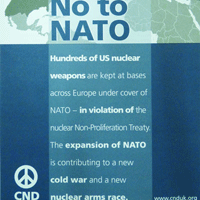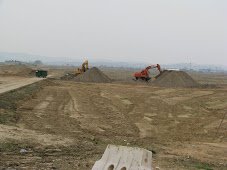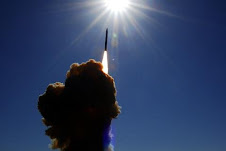* StopNATO
U.S. Plans Coordinated Global Counterintelligence Operations
Russian Information Agency Novosti
September 16, 2009
U.S. intelligence was called to attention Andrei Fedyashin
-Director of National Intelligence Dennis Blair mentioned a number of "new
concerns" reflected in the NIS, including the global economic crisis, a
potential global pandemic (like avian or swine flue), and climate change leading
to nations competing over energy and water resources.
Blair did not mention all of the new concerns. The report also raises concern
about China's aggressive pursuit of natural resources around the world and its
efforts to modernize its military, and states that Russia may also try to
reassert itself as a regional or global power.
-Blair is ready to give American intelligence agencies broader
counterintelligence missions. In the past, counterintelligence was directed
primarily at exposing foreign spies. Now it has been elevated to the level of a
priority mission for the entire American intelligence community.
MOSCOW: The United States intelligence community has received broader and more
specific objectives for countering threats to American national security and
interests.
Major strategic goals for all 16 American intelligence agencies have been set
forth in a new four-year National Intelligence Strategy (NIS), which has been
submitted to Congress. This is the first blueprint of this kind during the Obama
Administration. By tradition, it is drafted by the Director of National
Intelligence (DNI).
The position of DNI was created in 2004. The DNI consults the president and a
national security advisor on all intelligence issues, and coordinates the
intelligence activities of the U.S. intelligence community, which includes the
CIA, the FBI, the National Security Agency, the main intelligence departments of
the Navy and Army, the intelligence agencies of the Department of State and the
Department of Energy, etc.
The NIS offers general guidance to all American intelligence agencies, which are
obliged to coordinate their specific objectives with it. By and large, the
objectives of U.S. intelligence activities have changed little in the last eight
years, since the fundamental revision of the current threats to national
security in the wake of 9/11. They are to identify and suppress of extremists,
paramilitary separatist units, and terrorist groups that are trying to gain
access to nuclear weapons. Other objectives include controlling the nuclear
threats from Iran and North Korea, stopping the proliferation of weapons of mass
destruction, uncovering potential crises, etc.
Speaking to journalists in San Francisco on September 16, Director of National
Intelligence Dennis Blair mentioned a number of "new concerns" reflected in the
NIS, including the global economic crisis, a potential global pandemic (like
avian or swine flue), and climate change leading to nations competing over
energy and water resources.
Blair did not mention all of the new concerns. The report also raises concern
about China's aggressive pursuit of natural resources around the world and its
efforts to modernize its military, and states that Russia may also try to
reassert itself as a regional or global power. Both countries are mentioned as
potential threats to the United States in cyberspace.
Blair seems to be ready to shake up the entire U.S. intelligence community in
response to its obviously inadequate response to threats to the United States.
To understand his motives, we should recall who he is. Sixty-two-year-old Dennis
Cutler Blair is a retired admiral, the third DNI, and a one-hundred-percent
American tough guy. He is a sixth-generation naval officer. In his
thirty-four-year naval career, he commanded frigates, missile destroyers, and
the Kitty Hawk Battle Group aircraft carrier. His last strictly naval position
was the commander-in-chief of U.S. Pacific Command. He then served on the Joint
Chiefs of Staff and as Associate Director of Central Intelligence for Military
Support.
Blair is known for his quick temper and frequent disregard for the chain of
command (on several occasions, he refused to implement political instructions
from the U.S. Department of State in Asia). In the Navy, he is primarily
appreciated for his irrepressible character and his inclination towards purely
naval ventures. Young American naval officers like to recount how Blair, then
the captain of the Cochrane missile destroyer, water-skied behind it at a speed
of 38 knots. Last January, President Barack Obama appointed him DNI.
It is worth noting that even during the Bush administration, American
intelligence officers were not happy about the creation of another coordinator
position. After a complaint from the first DNI, John Negroponte, George W. Bush
even had to issue a special directive ordering intelligence agencies to fulfill
the instructions and reply to the inquiries of the Office of the Director of
National Intelligence.
Now Blair is ready to give American intelligence agencies broader
counterintelligence missions. In the past, counterintelligence was directed
primarily at exposing foreign spies. Now it has been elevated to the level of a
priority mission for the entire American intelligence community. The NIS states
that the targets are now not only foreign governments but also "non-state
actors, violent extremist groups, cyber intruders and criminal organizations",
which are increasingly undermining U.S. interests in many different ways. It
cites attempts to "manipulate U.S. policy and diplomatic efforts, disrupt or
mitigate the effectiveness of our military plans and weapons systems, and erode
our economic and technological advantage."
The last phrase should be remembered. It is significant in the context of the
afore-mentioned nuclear threat coming from Iran and North Korea, and Russia's
"global revisionism." After such statements it is difficult to believe that
Obama has given up on the deployment of new components of the missile defense
shield in Poland and the Czech Republic. This prospect seems even less likely in
light of the fact that Republicans and neo-Conservatives have launched a fierce
campaign against him.
A special conference on missile defense in Europe was recently put on by the
influential far-right Heritage Foundation, located in Washington, D.C.
Leading right-wing political analysts stated at that conference that Russia's
approach to the problem does not reflect the realities of this century, and is
based on the failure to comprehend American technological achievements. The
message is clear - if Obama rejects the plan drafted under Bush, it will mean
that he also fails to comprehend many things in the United States. And that is
very bad for America.
Stop NATO
Blog site
Friday, September 18, 2009
Subscribe to:
Post Comments (Atom)

![[URGENT PLEA: In Update] EMERGENCY in GANGJEONG Since AUG. 24, 2011](http://2.bp.blogspot.com/-3iz8k-USXVY/TlmRYhhIYtI/AAAAAAAAL2c/9dbF85ZIkIs/s227/jejusit.jpg)



![[Solidarity from Japan for the Jeju] 253 individuals and 16 groups/organizations](http://2.bp.blogspot.com/_gnM5QlRx-4c/TR_YeNVE1yI/AAAAAAAAHWQ/ARyf6oQN0S0/S227/jeju_12_10j.jpg)

![[Translation] Korean organizations' statement: Immediately cancel the joint ROK-US drill Nov 26](http://2.bp.blogspot.com/_gnM5QlRx-4c/TPOE8VKXHFI/AAAAAAAAGlM/8lryt-8sFjc/S227/1.jpg)
![HOT! [Hankyoreh Hani TV] Beneath the Surface: the investigation into the sinking of the Cheonan](http://4.bp.blogspot.com/_gnM5QlRx-4c/TOI83qht8aI/AAAAAAAAGXU/22SW6Q5ntV8/S227/HaniTV%2BCheonan.gif)



![[Translation]Statement against illegal inspection and unjust lay-off by the Kunsan USAFK!(Nov_2010)](http://4.bp.blogspot.com/_gnM5QlRx-4c/TOPLsVkZMqI/AAAAAAAAGZs/3YnnckIyAaY/S227/gunsan%2Bprotest.gif)
![[Translation] Korean organizations' statement against dispatching special force to the UAE on Nov.](http://4.bp.blogspot.com/_gnM5QlRx-4c/TOP95zHXlCI/AAAAAAAAGak/E0Ug1XtUFfM/S227/antiwarpeace.jpg)
![[Translation] Stop, Joining MD!: South Korean activists' statement and writing on Oct. 25, 2010](http://3.bp.blogspot.com/_gnM5QlRx-4c/TOP7Es4_2sI/AAAAAAAAGac/eWVMPD-U4p0/S227/StopMD.jpg)
![[In Update] People First, NO G-20 (Nov. 6 to 12, Korea)](http://2.bp.blogspot.com/_gnM5QlRx-4c/TJd53XBzHlI/AAAAAAAAFQo/ldO9JPE3eqo/S227/left21_G20.jpg)
![[International Petition] Stop US helipad plan in Okinawa to save great nature](http://4.bp.blogspot.com/_gnM5QlRx-4c/TKC2AHRNzBI/AAAAAAAAFUo/yGWXODTw_uM/S227/yanbaru_w.jpg)

![[Global Network] against the first launch of Quasi-Zenith Satellite, Japan, on Sept. 11, 2010](http://4.bp.blogspot.com/_gnM5QlRx-4c/TIowa1boy4I/AAAAAAAAFDI/82rAi98uq-c/S227/Qzss-45-0_09.jpg)

![[In update] Some collections on the Koreans’ protests against the sanction & war on Iran](http://4.bp.blogspot.com/_gnM5QlRx-4c/TJMvke6t8zI/AAAAAAAAFO4/tamQ8LUnOOA/S227/No+Sanction+on+Iran.jpg)
![[Three International Petitions] to End the Korean war and peace treaty(or peace resolution)](http://1.bp.blogspot.com/_gnM5QlRx-4c/THef7bzWxYI/AAAAAAAAE44/wwdzSDfYhdw/S227/border.jpg)



![[Collection of Documents] No Base Learning and Solidarity Program_Korea(June 14 to 20, 2010)](http://1.bp.blogspot.com/_gnM5QlRx-4c/TCTvVuN8NeI/AAAAAAAAEek/8vBJVaHdk10/S227/No-Base-banner.jpg)
![Site Fwd:[John Hines] A U.S. Debate coach’s research trip on the Issues of Korea](http://3.bp.blogspot.com/_gnM5QlRx-4c/TINCO36mzzI/AAAAAAAAE_w/Rds12NcBOXM/S227/Jeju-Peace-Tour.jpg)


![[News Update] Struggle Against the Jeju Naval Base since Jan. 18, 2010](http://1.bp.blogspot.com/_gnM5QlRx-4c/S1vvWaP25uI/AAAAAAAACkg/QvpW1tgOlKM/S226/scrum1.jpg)


![[Urgent] Please spread the Letter!: There was no Explosion! There was no Torpedo! (May 26, 2010)](http://4.bp.blogspot.com/_gnM5QlRx-4c/S_9JmsKEU7I/AAAAAAAAEP8/sAWjSPqxzUI/S227/grounded.jpg)
![Text Fwd: [Stephen Gowans]The sinking of the Cheonan: Another Gulf of Tonkin incident](http://1.bp.blogspot.com/_gnM5QlRx-4c/TAL_FtYKQ-I/AAAAAAAAERE/NEEMijiEcRM/S227/lee-myung-bak.jpg)
![[Japan Focus]Politics in Command: The "International" Investigation into the Sinking of the Cheonan](http://1.bp.blogspot.com/_gnM5QlRx-4c/TBMJ2syJzyI/AAAAAAAAEZU/uTYZccU5vyk/S227/wen_jiabao_and_lee_myungbak.png)
![[Japan Focus] Who Sank the SK Warship Cheonan? A New Stage in the US-Korean War and US-China](http://2.bp.blogspot.com/_gnM5QlRx-4c/S_iQ2vE5ZpI/AAAAAAAAEOU/Oo1SPcAe8FE/S227/buoy_map.gif)
![[Updated on 12/13/10] [Translation Project] Overseas Proofs on the Damages by the Military Bases](http://4.bp.blogspot.com/_gnM5QlRx-4c/S-qSj59gPLI/AAAAAAAAEGM/mwjlFtPE-jo/S227/missile.jpg)
![[International Petition] Close the Bases in Okinawa](http://3.bp.blogspot.com/_gnM5QlRx-4c/S8-z3DYNwNI/AAAAAAAADo4/OswTSchK09M/S227/2.jpg)

![[In Update]Blog Collection: No Korean Troops in Afghanistan](http://4.bp.blogspot.com/_gnM5QlRx-4c/SwnlLD9IewI/AAAAAAAAB9E/oUPssnpNidA/S226/No-Troops-to--Afghanistan.jpg)











No comments:
Post a Comment